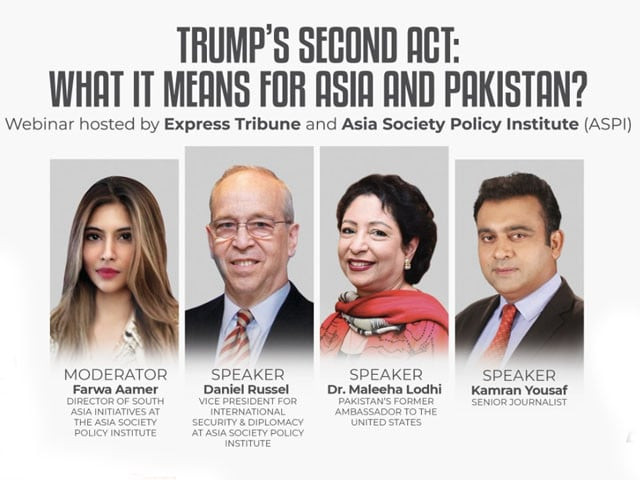Pakistan would choose China over US if necessary: Former ambassador Maleeha Lodhi
She addressed a webinar hosted by Asia Society Policy Institute, The Express Tribune with Daniel Russel, Kamran Yousaf

The Asia Society Policy Institute and The Express Tribune hosted a webinar titled ‘Trump's Second Act: What It Means for Asia and Pakistan’, aimed at analysing the implications of Donald Trump’s potential second term and its effects on Asia.
Expert panelists discussed pressing issues such as the evolving US-China relationship, the shifting geopolitical landscape in South Asia, and how Trump's policies may shape future US priorities in the region.
The virtual event, moderated by Farwa Aamer, Director of South Asia Initiatives at Asia Society, featured insights from Daniel Russel, Vice President of International Security and Diplomacy, Maleeha Lodhi, former Ambassador of Pakistan to the United States and former Permanent Representative to the UN, and Kamran Yousaf, journalist and host of The Review on Express News.
Maleeha Lodhi on US-China Relations and Pakistan’s Strategic Interests
Maleeha Lodhi, during the webinar, remarked that she did not foresee a major conflict between the US and China, citing Trump’s frequent statements about wanting to avoid conflict and end wars. She added that the world was moving towards a multipolar system, where many countries now have the power to influence global geopolitics.
Lodhi also discussed the US's diminishing interest in Afghanistan under the Trump administration, noting that if Afghanistan were to fall into chaos again and become a hub for terrorism, it could affect US-Pakistan relations.
She emphasised that the Trump administration’s focus was more on ensuring Afghanistan did not become a terrorist breeding ground rather than any significant engagement with the country itself.
On the shifting dynamic between Pakistan and the US, she highlighted that Pakistan’s future engagement with the US would depend on Pakistan’s own economic strength and political stability.
“Pakistan’s strategic interest today lies with China, not the US, as China meets Pakistan’s defence and economic needs in ways the US cannot,” she said. She further noted that while Pakistan will never be forced to choose between the two, should the need arise, Pakistan would align itself with China rather than the US.
Kamran Yousaf on Pakistan-US Relations and Trump’s Foreign Policy
Kamran Yousaf, a journalist with The Review on Express News, reflected on past US-Pakistan relations, noting that during the US elections, there was significant debate over which political party would be better for Pakistan.
“During Trump’s first term, he invited then-Prime Minister Imran Khan to the White House, and they met twice, but people forget that the US never appointed a full-time ambassador to Pakistan during that time,” he said.
Yousaf pointed out that while Trump initially suspended military training programmes and cut aid to Pakistan, he later revived some of these programmes. He also discussed the historic Iran nuclear deal during Trump's first term, explaining that Pakistan feared sanctions if it engaged in energy projects like the Iran gas pipeline.
“Trump’s decision to walk away from the nuclear deal diminished any chances of closer cooperation between Pakistan and Iran,” Yousaf stated.
Daniel Russel on the US-China Policy and Southeast Asia
Daniel Russel, Vice President of International Security and Diplomacy, discussed the broader implications of a potential shift in US policy towards China. He warned that such a shift could have far-reaching consequences for many countries.
He also noted that Southeast Asian countries were particularly concerned about Trump’s approach to North Korea. “Southeast Asia’s focus is very much on the economy, but there is a growing sense of uncertainty about how Trump will handle these issues,” Russel added.



















COMMENTS
Comments are moderated and generally will be posted if they are on-topic and not abusive.
For more information, please see our Comments FAQ